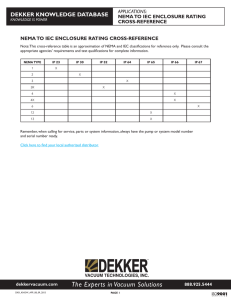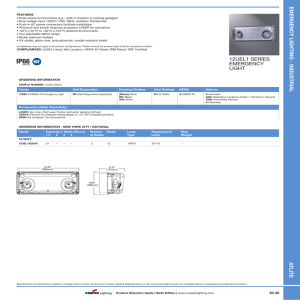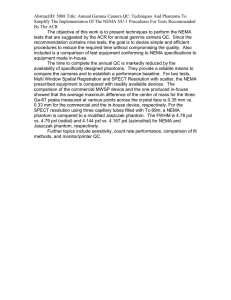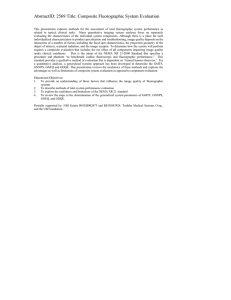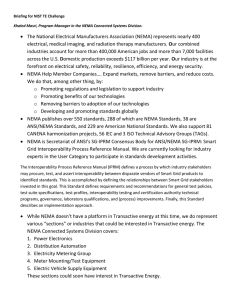Brochure
advertisement
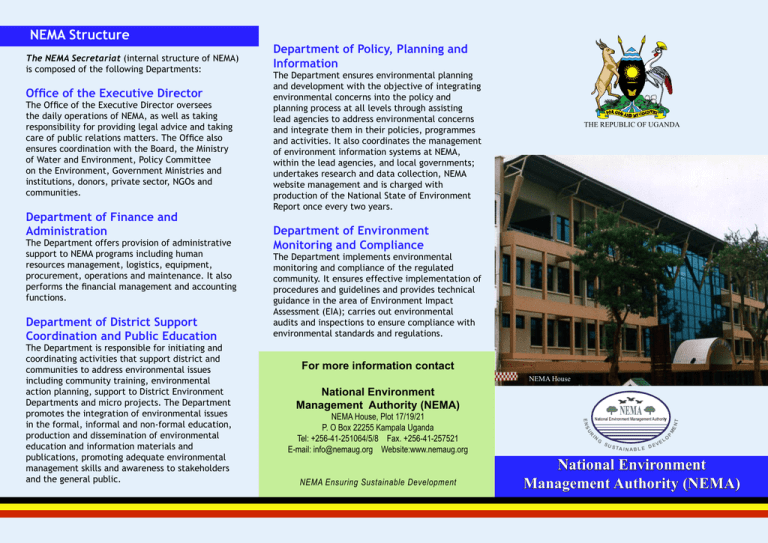
Department of Finance and Administration The Department offers provision of administrative support to NEMA programs including human resources management, logistics, equipment, procurement, operations and maintenance. It also performs the financial management and accounting functions. Department of District Support Coordination and Public Education Department of Environment Monitoring and Compliance The Department implements environmental monitoring and compliance of the regulated community. It ensures effective implementation of procedures and guidelines and provides technical guidance in the area of Environment Impact Assessment (EIA); carries out environmental audits and inspections to ensure compliance with environmental standards and regulations. For more information contact NEMA House National Environment Management Authority (NEMA) NEMA Ensuring Sustainable Development National Environment Management Authorityy UR NEMA House, Plot 17/19/21 P. O Box 22255 Kampala Uganda Tel: +256-41-251064/5/8 Fax. +256-41-257521 E-mail: info@nemaug.org Website:www.nemaug.org E NS The Department is responsible for initiating and coordinating activities that support district and communities to address environmental issues including community training, environmental action planning, support to District Environment Departments and micro projects. The Department promotes the integration of environmental issues in the formal, informal and non-formal education, production and dissemination of environmental education and information materials and publications, promoting adequate environmental management skills and awareness to stakeholders and the general public. THE REPUBLIC OF UGANDA T The Office of the Executive Director oversees the daily operations of NEMA, as well as taking responsibility for providing legal advice and taking care of public relations matters. The Office also ensures coordination with the Board, the Ministry of Water and Environment, Policy Committee on the Environment, Government Ministries and institutions, donors, private sector, NGOs and communities. The Department ensures environmental planning and development with the objective of integrating environmental concerns into the policy and planning process at all levels through assisting lead agencies to address environmental concerns and integrate them in their policies, programmes and activities. It also coordinates the management of environment information systems at NEMA, within the lead agencies, and local governments; undertakes research and data collection, NEMA website management and is charged with production of the National State of Environment Report once every two years. EN Office of the Executive Director Department of Policy, Planning and Information IN M The NEMA Secretariat (internal structure of NEMA) is composed of the following Departments: G P NEMA Structure SU S TA I E NABLE D VE LO National Environment Management Authority (NEMA) The National Environment Management Authority (NEMA) Background The National Environment Management Authority (NEMA) is a semi-autonomous institution, established in May, 1995, under the National Environment Act, Cap. 153, and became operational in December 1995, as the principal agency in Uganda, charged with the responsibility of coordinating, monitoring, regulating and supervising environmental management in the country. NEMA spearheads the development of environmental policies, laws, regulations, standards and guidelines; and guides Government on sound environmental management in Uganda. NEMA’s activities are focused on providing support to Government’s main goal of ensuring sustainable development through the National Development Plan (NDP); in accordance with the policy framework of the Government of Uganda and the Millennium Development Goals (MDGs). Mandate The National Environment Act (NEA), Cap. 153, stipulates the Mandate of NEMA as “the principal Agency in Uganda responsible for the management of the environment by coordinating, monitoring, regulating, and supervising all activities in the field of environment”. Vision “An Efficient Agency, With People in Uganda Living In a Clean, Healthy, Productive and Sustainable Environment”. Mission “To promote and ensure sound environmental management practices for sustainable development”. Goal “To promote sound environment management and prudent use of the environment and natural c) resources in Uganda”. The Development Objective NEMA’s Development objective is to create, establish and maintain an efficient mechanism for sustainable environment and natural resources management at the national, district and community levels. The Core Values Over the years NEMA has established a culture that pursues the following values: a) Client focus; b) Integrity and transparency; c) Professional motivation and commitment; d) Innovation and creativity; e) Open, cross-functional and all participatory decision making and problem solving; f) Partnerships and collaboration and, g) Passion for sustainable environment. d) e) f) g) h) i) Statutory Functions As a regulatory Agency, NEMA draws authority that is embedded in the National Environment Act Cap. 153, to: a) coordinate the implementation of Government policies and the decision of the Policy Committee on Environment; b) ensure the integration of environmental concerns in overall national j) k) l) m) planning through coordination with the relevant ministries, departments and agencies of government; liaise with the private sector, intergovernmental organisations, nongovernmental and Government agencies of other states on issues relating to the environment; propose environmental policies and strategies to the Policy Committee; initiate legislative proposals, standards and guidelines on the environment in accordance with the law; review and approve Environmental Impact Assessments and Environmental Impact Statements submitted in accordance with the National Environment Act, Cap. 153; promote public awareness through formal and non-formal education about environmental issues; undertake studies and submit such reports and recommendations with respect to the environment as the Government or the Policy Committee may consider necessary; ensure observance of proper safeguards in the planning and execution of all development projects, including those already in existence that have or are likely to have significant impact on the environment determined in accordance with schedule II of the National Environment Act, Cap. 153; undertake research, and disseminate information about the environment; prepare and disseminate the National State of the Environment Report (NSOER) once every two years; mobilise, expedite and monitor resources for environment management; and perform such other functions as the Government may assign to the Authority.
